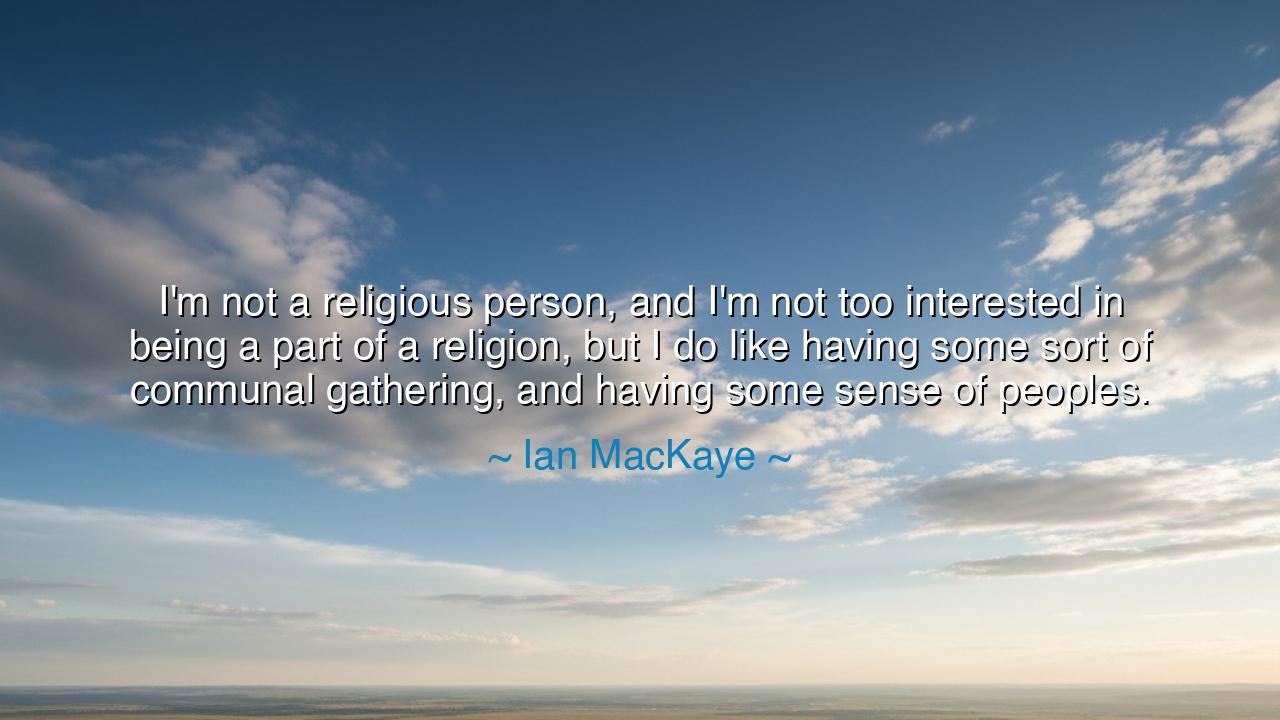
I'm not a religious person, and I'm not too interested in being a
I'm not a religious person, and I'm not too interested in being a part of a religion, but I do like having some sort of communal gathering, and having some sense of peoples.






“I’m not a religious person, and I’m not too interested in being a part of a religion, but I do like having some sort of communal gathering, and having some sense of peoples.” – Ian MacKaye
In these words, Ian MacKaye, a voice of the punk generation and a seeker of truth in his own right, touches upon a yearning that is ancient and eternal — the desire for community, for connection, for the fellowship of souls bound by shared experience rather than creed. Though he rejects the boundaries of formal religion, he honors the sacred impulse that gives rise to it: the human need to gather, to be seen, to belong. His words are not a dismissal of faith, but a redefinition of it — a reminder that spiritual belonging can exist beyond the walls of temples, that the divine can dwell not only in ritual, but in relationship.
Since the dawn of time, humanity has sought one another around fire and altar alike. The ancients understood that isolation withers the spirit. So they gathered — hunters in the caves, villagers in the square, elders in the council — to tell stories, to share bread, to remind one another that life is more bearable when hearts beat together. MacKaye’s sentiment, though born of the modern world, carries the echo of these primal gatherings. He speaks not of dogma or doctrine, but of the human need for belonging — that sacred thread that binds each of us to the tapestry of existence.
In rejecting organized religion, MacKaye does not reject reverence. Instead, he claims the right to find the holy in the human. His “communal gathering” is not a church, but a concert; not a sermon, but a song. For him, the congregation is found in the crowd that raises its voice as one, the shared pulse of rhythm and meaning that unites strangers in fleeting transcendence. And though the setting may differ from the temples of old, the experience is the same: the dissolving of self into something greater, the stillness that comes when many hearts move as one.
History, too, bears witness to this truth. In ancient Athens, long before cathedrals rose or choirs sang, the people gathered in open-air theatres to witness the tragedies of Sophocles and Euripides. They wept together, not because they were commanded by religion, but because they recognized themselves in the stories — their pride, their loss, their fragile humanity. In those communal gatherings, they found what MacKaye describes: not religion, but a sense of peoples — the spiritual nourishment that comes from shared presence. They left those gatherings not converted, but connected; not purified by ritual, but renewed by empathy.
There is power in this idea. In a world increasingly fragmented by belief and ideology, MacKaye’s words remind us that the sacred is not confined to belief. It is found wherever humans meet in sincerity and care. When neighbors share a meal, when artists perform for love rather than fame, when strangers help one another in times of disaster — these are the new temples of the spirit. They are built not of stone, but of compassion. In such moments, we realize that the divine does not require hierarchy, only humanity.
The lesson is clear: do not mistake faith for walls, nor spirituality for systems. You do not need a title or a priest to belong to something greater. The spirit of life itself calls you to gather, to listen, to speak, to build community wherever your feet stand. Find your communal gathering — whether it be among musicians, poets, gardeners, or quiet friends — and let it be your sanctuary. For the heart of religion has always been communion, and communion begins wherever two or more souls come together in truth.
So, as the ancients once gathered beneath the open sky, gather too in your own way. Seek not uniformity, but unity; not dogma, but dialogue. Remember that the holy lives not only in sacred texts, but in shared laughter, in helping hands, in the unspoken bond of fellowship. When you stand among others with open heart and open mind, you will feel it — that ancient warmth that moves through all gatherings of love and purpose. And then, like Ian MacKaye, you will understand: even without religion, you still belong to the great circle of peoples.






AAdministratorAdministrator
Welcome, honored guests. Please leave a comment, we will respond soon